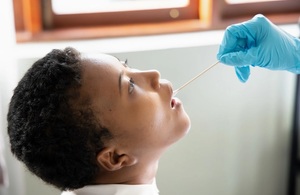CBBC doctors join NHS Test and Trace in fight against coronavirus
A new website will help children and young people better understand how to keep safe during the pandemic, as well as guiding them through the testing process.

The new Storicise website – launched by the government today – has been developed for schools by NHS Test and Trace in collaboration with the doctors who feature in CBBC’s Operation Ouch! The website is packed full of coronavirus facts, presented in a format designed to inform and reassure children.
Keeping children and young people in full-time education is a national priority, as this is best for their mental health, wellbeing and to help them catch up on any missed learning time. Schools and colleges across the country have also worked hard to put protective measures in place that are helping reduce the risk of the virus being transmitted.
In January, asymptomatic testing will be rolled out to schools across the country as part of ongoing efforts to slow the spread of the coronavirus and reduce transmission. Asymptomatic testing pilots have shown this to be the most effective way to prevent children from missing school if their class bubble is sent home.
The new platform has been designed to support classroom teachers on the new testing programme, with engaging content and resources delivered by the well-known Drs Xand and Chris Van Tulleken. Materials use interactive storytelling and quiz-style games to bring to life the work of NHS Test and Trace so children aged 5 to 18 can better understand coronavirus, the importance of testing, and how they can stay safe through regular handwashing and creating space around others.
Health Minister Lord Bethell said:
For many children, the last year has been very hard, with changes to their routine and education as well as less contact with their friends and loved ones. Understandably, they may feel anxious about coronavirus.
These new resources have been designed to help alleviate these worries in a fun and age-appropriate way. It’s so important that we all support children and young people to stay safe, healthy and happy.
Interim Executive Chair of the National Institute for Health Protection Baroness Dido Harding said:
Testing is integral to tackling the spread of coronavirus, and testing in schools can help children to protect themselves, their loved ones and their community by taking part.
We know that if we empower children and young people with information, they’ll make the right choices to keep themselves and those around them safe.
That’s why we’re thrilled to be teaming up with Dr Xand and Dr Chris to offer children the knowledge they need, and help teachers and schools explain the changes their students may see when they come to school after the holidays.
The platform’s approach is based on work piloted by the University of Southampton and can be adapted across the age ranges to engage with children at every key stage. It can be delivered online or offline in both schools and non-formal educational settings and will give children the knowledge they need to make positive behaviour choices.
NHS Test and Trace and the Department for Education have worked in consultation with the University of Southampton, the Scout Association, the NSPCC and the PSHE (Personal, Social, Health and Economic) Association for this platform.
The Scouts Association has also produced materials that are live on their website and have been shared with 100,000 leaders. These materials have been designed to encourage discussion about coronavirus and testing with the children and young people who are members of beavers, cubs, scouts and explorers.
Background information
The materials supplied to the Scouts will be made available for other non-formal education organisations to use.
About the mass asymptomatic testing pilot
Mass asymptomatic testing using lateral flow devices has been piloted in schools since November 2020.
The schools selected vary in size and are across different geographies, and in areas with different coronavirus prevalence rates.
The pilot demonstrated that there is less disruption to in-class lessons if students test negative for coronavirus, even if someone in their bubble tests positive.
It also demonstrated that positive cases of coronavirus were discovered more quickly and sent to self-isolate, which prevents further spread of the virus within the community.